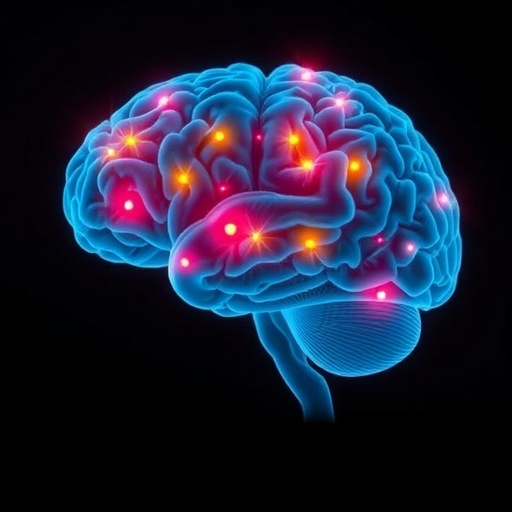In a groundbreaking exploration of the neurological underpinnings of chronic schizophrenia, researchers have unveiled promising findings on the impact of theta burst stimulation (TBS) on cognitive functions. Published in the esteemed journal BMC Psychiatry, this comprehensive study leverages the precision of functional near-infrared spectroscopy (fNIRS) to investigate how targeted brain stimulation affects blood oxygen levels and cognitive abilities in patients enduring chronic stages of schizophrenia. The implications of this research could redefine therapeutic strategies for a disease that has long challenged clinicians and patients alike.
Theta burst stimulation, a novel and non-invasive brain stimulation technique, has garnered significant attention in neuroscience due to its ability to modulate neuronal activity with high temporal efficiency. In this latest study, investigators applied TBS to the left dorsolateral prefrontal cortex (DLPFC)—a brain region deeply implicated in executive function and working memory deficits commonly observed in schizophrenia. By focusing on this critical hub, the researchers aimed to uncover whether artificially enhancing cortical excitability translates into measurable improvements in cognitive performance.
The study enrolled one hundred individuals diagnosed with stable chronic schizophrenia. Participants were randomly assigned into two cohorts: an experimental group receiving authentic TBS treatment and a control group subjected to sham stimulation, which mimics the procedure without delivering actual therapeutic pulses. Over a four-week intervention period, both groups underwent systematic cognitive assessments, utilizing standardized instruments such as the Mini-Mental State Examination (MMSE) and the Mattis Dementia Rating Scale Second Edition (MDRS-2). These tools offer nuanced insights into domains including attention, memory, initiation, and conceptual reasoning.
Crucially, the use of functional near-infrared spectroscopy allowed for precise measurement of cerebral blood oxygenation during cognitive tasks. Participants performed a verbal fluency task (VFT)—a challenging exercise that requires active retrieval and generation of words, tapping into the cognitive circuits targeted by TBS. This real-time monitoring of hemoglobin signal fluctuations, particularly in oxygenated and deoxygenated forms, provided a window into the brain’s metabolic responses to the stimulation.
Data analysis revealed a compelling interaction between treatment group and time, demonstrating that the experimental group exhibited significant enhancements across multiple cognitive parameters compared to the sham group. Total scores on both MMSE and MDRS-2 increased, with pronounced gains in domains of attention and memory. Within-subject comparisons further underscored the efficacy of TBS, revealing marked cognitive improvements from baseline to post-treatment. These findings suggest that TBS facilitates neural plasticity mechanisms conducive to restoring impaired cognitive functions.
From a neurophysiological perspective, the fNIRS measurements uncovered notable decreases in deoxyhemoglobin concentrations specifically within channel 47, corresponding anatomically to the left DLPFC. This shift implies enhanced oxygen consumption and cerebral metabolism in the stimulated cortex, corroborating the hypothesis that TBS energizes targeted brain areas by boosting local blood flow and neural activity. Such findings position TBS not merely as a symptomatic intervention but as a modality capable of modulating cortical physiology at a foundational level.
Intriguingly, the investigators also explored demographic influences on treatment response. Regression analyses illuminated age as a significant predictor of cognitive gains measured by MDRS-2 scores, implying that younger patients may derive greater benefit from TBS. This age-dependent effect underscores the necessity of personalized medicine approaches in neuropsychiatric care, prompting future research to delineate optimal treatment windows and dosage schemas tailored to patient characteristics.
This study emerges amid a growing body of literature probing the efficacy of neuromodulation in psychiatric disorders. While transcranial magnetic stimulation (TMS) and its variants have been widely studied, the unique patterned bursts characteristic of TBS appear to induce more robust and enduring synaptic changes. By applying this technique to chronic schizophrenia, a condition traditionally refractory to many treatments, the research breaks new ground in rehabilitation potentials.
Moreover, the integration of fNIRS technology represents a methodological advance, enabling the simultaneous capture of cognitive outcomes and underlying hemodynamic alterations. This dual-layer approach allows for mechanistic insights that bridge behavioral observations and cerebral physiology, offering a comprehensive understanding of how TBS modulates brain function in vivo.
Despite promising results, the authors caution that further large-scale trials and longitudinal follow-ups are essential to validate and extend these findings. The durability of cognitive improvements, potential side effects, and combinatory effects with pharmacotherapy remain important areas for future investigation. Nevertheless, the data offer a hopeful avenue for enhancing the quality of life and functional independence of patients grappling with chronic schizophrenia.
In conclusion, by harnessing the power of theta burst stimulation and advancing neuroimaging techniques, this study marks a pivotal step towards effective cognitive enhancement in schizophrenia. It illuminates how precisely timed bursts of electromagnetic energy can recalibrate disturbed neural circuits, catalyze neurovascular responses, and ultimately uplift cognitive faculties compromised by the disease. As neuroscience inches closer to decoding the complex brain dynamics of schizophrenia, interventions like TBS could herald a new epoch of targeted, evidence-based therapies poised to transform psychiatric care.
Subject of Research: The effect of theta burst stimulation on cognitive function and cerebral blood oxygenation in patients with chronic schizophrenia.
Article Title: Effects of theta burst stimulation on cognitive function and characteristics of blood oxygen alterations based on near-infrared spectroscopy in chronic schizophrenia.
Article References:
Gao, C., Li, G., Zhang, X. et al. Effects of theta burst stimulation on cognitive function and characteristics of blood oxygen alterations based on near-infrared spectroscopy in chronic schizophrenia. BMC Psychiatry 25, 784 (2025). https://doi.org/10.1186/s12888-025-07240-1
Image Credits: AI Generated




